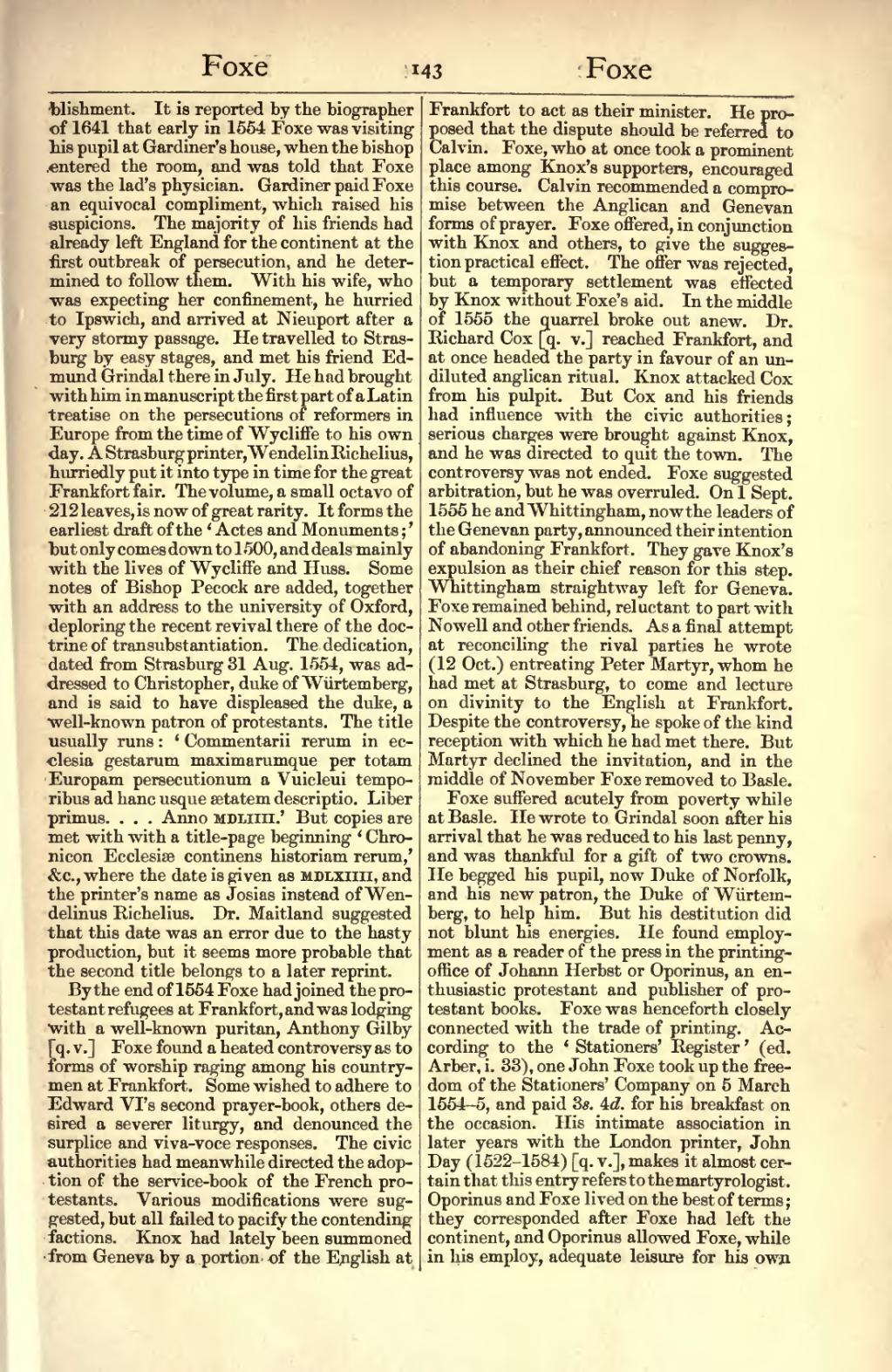blishment. It is reported by the biographer of 1641 that early in 1554 Foxe was visiting his pupil at Gardiner's house, when the bishop entered the room, and was told that Foxe was the lad's physician. Gardiner paid Foxe an equivocal compliment, which raised his suspicions. The majority of his friends had already left England for the continent at the first outbreak of persecution, and he determined to follow them. With his wife, who was expecting her confinement, he hurried to Ipswich, and arrived at Nieuport after a very stormy passage. He travelled to Strasburg by easy stages, and met his friend Edmund Grindal there in July. He had brought with him in manuscript the first part of a Latin treatise on the persecutions of reformers in Europe from the time of Wycliffe to his own day. A Strasburg printer, Wendelin Richelius, hurriedly put it into type in time for the great Frankfort fair. The volume, a small octavo of 212 leaves, is now of great rarity. It forms the earliest draft of the ‘Actes and Monuments;’ but only comes down to 1500, and deals mainly with the lives of Wycliffe and Huss. Some notes of Bishop Pecock are added, together with an address to the university of Oxford, deploring the recent revival there of the doctrine of transubstantiation. The dedication, dated from Strasburg 31 Aug. 1554, was addressed to Christopher, duke of Würtemberg, and is said to have displeased the duke, a well-known patron of protestants. The title usually runs: ‘Commentarii rerum in ecclesia gestarum maximarumque per totam Europam persecutionum a Vuicleui temporibus ad hanc usque ætatem descriptio. Liber primus. … Anno mdliiii.’ But copies are met with with a title-page beginning ‘Chronicon Ecclesiæ continens historiam rerum,’ &c., where the date is given as MDLXIIII, and the printer's name as Josias instead of Wendelinus Richelius. Dr. Maitland suggested that this date was an error due to the hasty production, but it seems more probable that the second title belongs to a later reprint.
By the end of 1554 Foxe had joined the protestant refugees at Frankfort, and was lodging with a well-known puritan, Anthony Gilby [q. v.] Foxe found a heated controversy as to forms of worship raging among his countrymen at Frankfort. Some wished to adhere to Edward VI's second prayer-book, others desired a severer liturgy, and denounced the surplice and viva-voce responses. The civic authorities had meanwhile directed the adoption of the service-book of the French protestants. Various modifications were suggested, but all failed to pacify the contending factions. Knox had lately been summoned from Geneva by a portion of the English at Frankfort to act as their minister. He proposed that the dispute should be referred to Calvin. Foxe, who at once took a prominent place among Knox's supporters, encouraged this course. Calvin recommended a compromise between the Anglican and Genevan forms of prayer. Foxe offered, in conjunction with Knox and others, to give the suggestion practical effect. The offer was rejected, but a temporary settlement was effected by Knox without Foxe's aid. In the middle of 1555 the quarrel broke out anew. Dr. Richard Cox [q. v.] reached Frankfort, and at once headed the party in favour of an undiluted anglican ritual. Knox attacked Cox from his pulpit. But Cox and his friends had influence with the civic authorities; serious charges were brought against Knox, and he was directed to quit the town. The controversy was not ended. Foxe suggested arbitration, but he was overruled. On 1 Sept. 1555 he and Whittingham, now the leaders of the Genevan party, announced their intention of abandoning Frankfort. They gave Knox's expulsion as their chief reason for this step. Whittingham straightway left for Geneva. Foxe remained behind, reluctant to part with Nowell and other friends. As a final attempt at reconciling the rival parties he wrote (12 Oct.) entreating Peter Martyr, whom he had met at Strasburg, to come and lecture on divinity to the English at Frankfort. Despite the controversy, he spoke of the kind reception with which he had met there. But Martyr declined the invitation, and in the middle of November Foxe removed to Basle.
Foxe suffered acutely from poverty while at Basle. He wrote to Grindal soon after his arrival that he was reduced to his last penny, and was thankful for a gift of two crowns. He begged his pupil, now Duke of Norfolk, and his new patron, the Duke of Würtemberg, to help him. But his destitution did not blunt his energies. He found employment as a reader of the press in the printing-office of Johann Herbst or Oporinus, an enthusiastic protestant and publisher of protestant books. Foxe was henceforth closely connected with the trade of printing. According to the ‘Stationers' Register’ (ed. Arber, i. 33), one John Foxe took up the freedom of the Stationers' Company on 5 March 1554–5, and paid 3s. 4d. for his breakfast on the occasion. His intimate association in later years with the London printer, John Day (1522–1584) [q. v.], makes it almost certain that this entry refers to the martyrologist. Oporinus and Foxe lived on the best of terms; they corresponded after Foxe had left the continent, and Oporinus allowed Foxe, while in his employ, adequate leisure for his own
